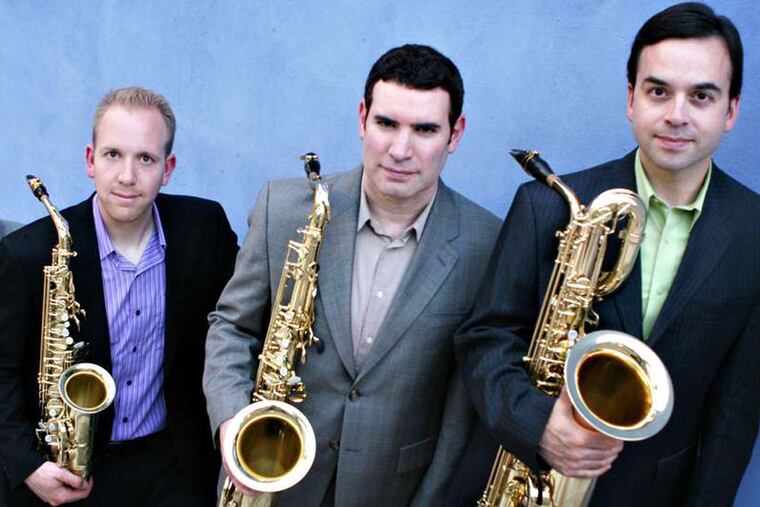Review: Prism offers a festival of premieres
Winning a Pulitzer Prize guarantees nothing except high expectations for continued greatness and a durability that may or may not come to pass. When did you last hear Leslie Bassett's Variations for Orchestra, given the honor in 1966 after Eugene Ormandy and the Philadelphia Orchestra took it for a spin at the Academy of Music?

Winning a Pulitzer Prize guarantees nothing except high expectations for continued greatness and a durability that may or may not come to pass. When did you last hear Leslie Bassett's Variations for Orchestra, given the honor in 1966 after Eugene Ormandy and the Philadelphia Orchestra took it for a spin at the Academy of Music?
Friday night's world premiere at Curtis' Gould Hall of Cha by the saxophonists of the Prism Quartet arrived just as the confetti was settling around its composer, Julia Wolfe, who won this year's Pulitzer for Anthracite Fields. Did this knowledge alter the way we heard Cha? The piece is rooted in Wolfe's father's love of dancing and is laced with a Latino feel. It gathers energy like a train, an accelerating bass note in one sax and the sound of hissing air from another. It has momentum if not a lot of harmonic progress, and moves skillfully toward a charming boisterousness. There was no particular innovation here, but done playfully by the Prismers, it left you feeling danced out, in a nice way.
If it was innovation you came for, there was quite a bit on this program - 10 world premieres. It was valuable to hear David Hertzberg's strikingly original murmurations (2014). The Juilliard- and Curtis-trained composer establishes a soundscape in this longish piece that, in its harmonic language, grows out of non-serial Berg and Schoenberg but, in the ghostly way it reveals itself, resembled little else. When it would end was hard to predict, giving it an elusive form, which was one thing it had in common with Matthew Levy's Above. Levy, Prism's tenor sax member, put himself in the neighborhood of Barber in this lyrical piece. Generally peaceful, it strikes a nice balance between bunches of tension and arrival points but still manages to resist conventional expectations.
Special effects and cultural influences were manifold - Kyle Bartlett's using the sax keys as percussion instruments in Lethal Sigh, Emma O'Halloran's fluttery textures and birdlike mania in Night Music, jazz/blues in Solon Snider's Four Tableaus, the funky strut of Michael Daugherty's Steamboat, a deconstructed fanfare in Jonathan Russell's Three Triffles, the mellifluous, rolling sounds of Mark Macaluso's Memories in the Wind.
If the swinging chase-scene music of "Beggar's Lace," the second movement of Viet Cuong's Prized Possessions, left you breathless, it spoke in a way for an entire concert that functioned as a happily chaotic report from the compositional front.
215-854-5611